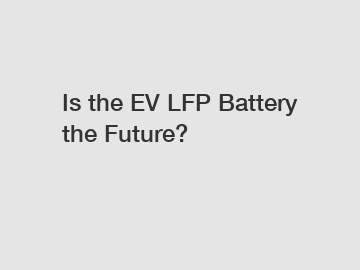Is the EV LFP Battery the Future?
The electric vehicle (EV) industry is rapidly evolving, with major advancements in battery technology paving the way for a cleaner and more sustainable future. One of the latest innovations in EV batteries is the Lithium Iron Phosphate (LFP) battery, which has been gaining popularity among automakers and consumers alike. But is the LFP battery the future of EV technology?
LFP batteries have several advantages over traditional Lithium-ion batteries, including increased safety, longer lifespan, and faster charging capabilities. These batteries are also more environmentally friendly, as they do not contain cobalt or nickel, which are often sourced through unethical and unsustainable mining practices. This makes LFP batteries a more sustainable option for powering electric vehicles.
In addition to their environmental benefits, LFP batteries also offer improved performance and reliability. These batteries are known for their high thermal stability, which reduces the risk of overheating and thermal runaway, a common issue with traditional Lithium-ion batteries. This makes LFP batteries a safer option for EV manufacturers and consumers alike.

Another major advantage of LFP batteries is their longer lifespan compared to traditional Lithium-ion batteries. LFP batteries can last up to 10 years or more, making them a cost-effective option for EV owners in the long run. This longevity is also beneficial for the environment, as fewer batteries will need to be replaced and recycled over time.
One of the main drawbacks of LFP batteries is their lower energy density compared to traditional Lithium-ion batteries. This means that LFP batteries may not be able to store as much energy as their counterparts, leading to a shorter driving range for electric vehicles. However, advancements in battery technology are constantly improving energy density, so this may not be a major issue for LFP batteries in the future.
Despite their lower energy density, LFP batteries are still a competitive option for electric vehicles due to their other advantages, such as safety, reliability, and longevity. As EV manufacturers continue to innovate and improve battery technology, LFP batteries may become an even more viable option for powering electric vehicles in the future.
Many automakers are already adopting LFP batteries in their EV models, including Tesla, which recently announced plans to use LFP batteries in some of its vehicles. This move signifies the growing popularity and acceptance of LFP batteries in the EV industry, solidifying their position as a potential future technology for electric vehicles.
In conclusion, the LFP battery has the potential to be a game-changer in the EV industry. With its numerous advantages, including increased safety, longer lifespan, and environmental benefits, LFP batteries offer a promising future for electric vehicles. While energy density may be a concern, advancements in battery technology are constantly pushing the boundaries of what is possible, making LFP batteries a viable option for powering electric vehicles in the years to come.
As the demand for cleaner and more sustainable transportation continues to grow, the LFP battery may just be the future of EV technology. With their safety, reliability, and longevity, LFP batteries have the potential to revolutionize the way we think about electric vehicles and pave the way for a greener future. So, as we look ahead to the future of EV technology, it's clear that the LFP battery is a technology worth keeping an eye on.
For more information, please visit battery lithium iron phosphate lifepo4, lithium iron phosphate battery manufacturers, VDA Standard.


